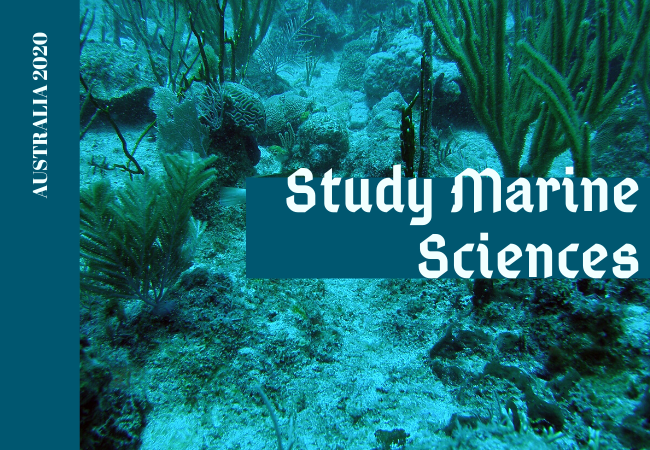
While oceans cover 71 percent of the Earth’s surface, it’s estimated that two-thirds of marine species still remain unknown, and 95 percent of the underwater world remains unexplored.
Did you know?
The speed of sound in water is 1,435 m/sec – nearly five times faster than the speed of sound in air.
What is Marine Science?
Marine science is not just about the ocean and the animals underwater, Marine science covers a wide range of disciplines from across the natural sciences. By enrolling to study Marine Science, you will be exposed to various marine-related topics from the fields of zoology, geology, ecosystem dynamics, conservation, even paleoceanography and many more interesting topics. Not only that, at the same time, you will be equipped with a solid foundation in basic science skills like statistics, data analysis, including critical thinking, academic writing and communication skills.
Did you know?
There are more historic artifacts under the sea than in all of the world’s museums.
What are the Career Opportunities if I study Marine Sciences?
The most frequent question from students is “What are the career opportunities?”. Since Marine Science is not a famous course among the students, many of them doubt the future of Marine Science degree.
“What can I do with my Marine Science degree?”
“Is studying Marine Science worth it?”
Although the course itself is unpopular, it’s a different case when it comes to the career prospects. Careers in Marine Science are significant to the world and society, today and in the future.

Did you know?
The lowest known point on Earth, called the Challenger Deep, is 11,034 m deep, in the Marianas Trench in the western Pacific.
What are the Skills Required to study Marine Sciences in Australia?
You might be wondering your eligibility to embark on the journey of Marine Science since it holds a special meaning to the world. As heavy as the responsibility of the careers, the same goes for the skills needed to be in the Marine Science sector.
There’s a reason why Marine Science is underrated till this day. It is one of the subjects that has a high level of competition when it comes to job placements. In order for you to excel and succeed with this degree, it requires more than just interest and intelligence.

Did you know?
It’s possible to find rivers and lakes beneath the ocean.
What are the General Entry Requirements to study Marine Sciences in Australia?
To add to that, the brain is indeed what makes you compatible enough to enroll in the top universities to study Marine Science. If you are confident that you have fulfilled the list of skills needed, take a look at the requirements on the paper;

*The requirements may vary among universities, for enquiries on other Year 12 equivalent entry requirements, contact Excel Education.
Did you know?
90% of all volcanic activity occurs in the oceans.
Which are the Best Universities to study Marine Sciences in Australia?
The most important part of all, university is the place that will help you reach your dreams and continue your passion in Marine Science.
In this technological era, nothing can get in our way to discover more about the oceans in the world. From the intelligent facilities to the respected and experienced lecturers, alongside with a great environment to study with friends, we are blessed to be given the opportunity to learn in depth about Marine Sciences.
1. James Cook University
“The JCU Marine Science degree is one of the most respected courses of its kind in the world and its Marine and Fresh Water Biology is ranked number 1 in the world by the Centre for World University Rankings.”
Program Name | Bachelor of Marine Science |
Program Duration | 3 years |
Intakes | February, July |
Indicative Annual Fee 2020 | AUD$37,680 |
2. University of Queensland
“UQ has the largest and best marine research facilities of any Australian tertiary institution, and also possesses the largest assembly of marine scientists in the state, and possibly Australia. “
Program Name | Bachelor of Science (Marine Science) |
Program Duration | 3 years |
Intakes | February, July |
Indicative Annual Fee 2020 | AUD$44,736 |
3. University of Melbourne
“You’ll become an expert in marine biological systems, and in the application of ecological principles and environmental management strategies.”
Program Name | Bachelor of Science (Marine Biology) |
Program Duration | 3 years |
Intakes | February, July |
Indicative Annual Fee 2020 | AUD$45,944 |
4. University of New South Wales
“We solve complex mysteries, investigate issues of global importance and invent and build technologies to shape the future. We deliver the best balance of theory and practical work to equip you with the skills, knowledge and experience to fast track your career”
Program Name | Bachelor of Science (Marine and Coastal Science) |
Program Duration | 3 years |
Intakes | March, November |
Indicative Annual Fee 2020 | AUD$47,760 |
5. University of Adelaide
“Our Bachelor of Science (Marine Biology) has a focus on contemporary marine biology practices on both a local and global scale, with a five-star student satisfaction ranking for teaching quality and overall experience”
Program Name | Bachelor of Science (Marine Biology) |
Program Duration | 3 years |
Intakes | February, July |
Indicative Annual Fee 2020 | AUD$38,500 |
6. University of Western Australia
“UWA is ranked first in Australia for Agricultural Sciences, Biological Sciences, Environmental Sciences and Engineering, and Marine/Ocean Engineering by the Academic Ranking of World Universities in 2018.”
Program Name | Bachelor of Science (Marine Science) |
Program Duration | 3 years |
Intakes | February, July |
Indicative Annual Fee 2020 | AUD$39,800 |
7. Griffith University
“With cutting-edge teaching and research strengths, Griffith University is an ideal location to study marine science. Located within easy access to a variety of extensive natural and artificial waterways, iconic surf beaches and the diverse wetlands and coastal biodiversity of Moreton Bay, the Gold Coast is the perfect natural laboratory.”
Program Name | Bachelor of Marine Science |
Program Duration | 3 years |
Intakes | February, July |
Indicative Annual Fee 2020 | AUD$32,500 |
8. University of Technology Sydney
“Excursions and field trips are common in our environmental and marine programs, where it provides access to forests, rivers, bugs and animals which are essential to our environment related courses.”
Program Name | Bachelor of Marine Biology |
Program Duration | 3 years |
Intakes | February, July |
Indicative Annual Fee 2020 | AUD$39,552 |
9. University of Tasmania
“This is the only Marine and Antarctic bachelor degree in Australia, located on the edge of one of the world’s best natural laboratories, with access to industry-leading facilities at the Institute for Marine & Antarctic Studies (IMAS) and internationally recognised experts to help you kick-start your career.”
Program Name | Bachelor of Marine and Antarctic Science |
Program Duration | 3 years |
Intakes | February, July |
Indicative Annual Fee 2020 | AUD$36,850 |
10. Curtin University
“Curtin uses innovative teaching tools such as ‘piercam’ to bring the coastal environment into the classroom. “
Program Name | Bachelor of Science (Coastal and Marine Science) |
Program Duration | 3 years |
Intakes | February, July |
Indicative Annual Fee 2020 | AUD$32,000 |
Contact us to find out more!
International Student enquiries:
Email: [email protected]
For more stories like this, join the Excel Education community on Facebook
Need help with your uni application? Connect with us here

Nurul Nadira
I am an English undergraduate student who reads and listens to bands.

